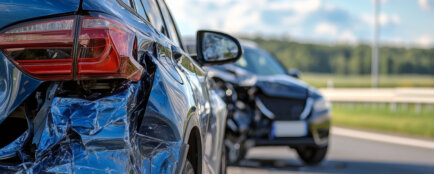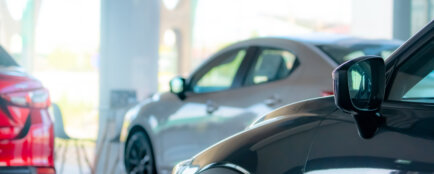What kind of car can you write off against your taxes
In order to write off a car as a tax deductible expense, it must be:
- Owned by the business – i.e. purchased or otherwise acquired property with documented title (e.g. purchase agreement, inheritance decree),
- Included in the business assets – recorded in the tax records or in the accounts,
- Used for business – used to earn, secure and maintain taxable income.
You cannot depreciate a vehicle that has been acquired, for example, as a loan or is used without being classified as business property.
Are you solving a similar problem?
Not sure how to handle car depreciation and taxes so you don't get it wrong?
We can help you navigate the law, whether it’s dealing with a specific tax situation, preparing for an audit by the tax authority or defending yourself in court.
I want to help
- When you order, you know what you will get and how much it will cost.
- We handle everything online or in person at one of our 6 offices.
- We handle 8 out of 10 requests within 2 working days.
- We have specialists for every field of law.
Who can write off a car on their taxes
The basic rule is that tax depreciation can be claimed by anyone who has legal title to the property and also meets any of the following conditions:
- A business that owns the vehicle – even if it provides the car to someone else as a rental, loan or lease. Even in these cases, the owner remains the owner and can depreciate the car.
- The original owner who provides the car to another entity for use (for example, a future buyer in a gradual transfer) but still holds the ownership rights to it.
- A lessee or leaseholder who has carried out technical improvements or extensive repairs to the vehicle in excess of CZK 80 000, in which case they can depreciate this investment but not the whole car. For example, costly repairs, conversions, etc.
A car is not depreciated for tax purposes as such, but its purchase price or other expenses related to its acquisition or appreciation. Depreciation is used to gradually reflect the cost of fixed assets (e.g. the car itself) in the entrepreneur’s costs – and thus reduce the tax base. There are two types of depreciation: tax and accounting.
Tax depreciation of a company car
Tax depreciation is used to allow the entrepreneur to gradually deduct the purchase price of the car from the tax base – i.e. from the amount on which income tax is calculated. It is therefore not an accounting operation, but a tax optimisation tool that is voluntary.
Conditions for applying depreciation
- The car must be classified as a commercial asset,
- the entry price of the vehicle must be at least CZK 80 000,
- the car must be used for business purposes (earning, securing and maintaining income),
- the application of depreciation is voluntary – it can be interrupted and renewed at any time.
Depreciation group of the car – how long is the car depreciated?
Cars and light commercial vehicles fall into depreciation group 2, for which the depreciation period is set at 5 years. Here you can choose one of two depreciation methods.
Straight-line and accelerated depreciation
If you buy a car and classify it as a business asset, you must choose whether to depreciate it on a straight-line or accelerated basis when you start depreciation. This choice is important because once you choose the depreciation method, you cannot change it in subsequent years.
Both methods result in you gradually deducting the cost of the car from your tax base. However, they differ in the distribution of depreciation over time:
Straight-line depreciation
Straight-line depreciation spreads the cost of the car over five years according to statutory percentages. The depreciation amount is lower in the first year and the same in the next four years.
When does straight-line depreciation pay off?
- If you expect a steady income in the following years,
- or if you don’t want to significantly reduce profits in the first few years,
- or if a large deduction would give you a tax loss that you have no way of using.
Straight-line depreciation also has the advantage of greater flexibility – you can choose whether to take the depreciation in full, in part, or not at all in a particular year. This allows you to better manage your tax base.
Accelerated depreciation
Accelerated depreciation allows you to write off more of the value of the car in the early years – especially in the second year. Each year thereafter, the depreciation is lower.
When is accelerated depreciation worthwhile?
- If you want to reduce your tax base as quickly as possible – especially in the early years,
- you know you’re going to make a profit, so you’ll actually use the tax savings,
- you want to “pull” your costs as soon as possible because, for example, you plan to downsize or close the business within a few years.
Accelerated depreciation is ideal for businesses with a quick return on investment or for those who want aggressive tax optimization right from the start.
Tax limit from 2024
From 1 January 2024, a maximum of CZK 2,000,000 of the cost of a car can be tax depreciated. If you buy a more expensive car, the amount above this limit is not tax deductible.
Exceptions to this limit apply to ambulances, hearse, cars for road transport under concession, cars put into use before 2024 and cars under lease.
Accounting depreciation of a company car
Accounting depreciation represents the gradual reduction in the carrying amount of a fixed asset (in this case a car) in a company’s accounts. They are intended to give a true representation of the wear and tear of the asset over time and thus provide a realistic picture of the entity’s performance and assets. This is not primarily about tax optimisation, but about correct financial reporting.
Who is affected?
Accounting depreciation is dealt with exclusively by entrepreneurs who keep double-entry accounts. In practice, this means in particular:
- legal entities (e.g. Ltd., Inc.),
- Self-employed persons who voluntarily keep accounts,
- medium-sized and large accounting units.
On the other hand, ordinary self-employed persons who keep only tax records do not use accounting depreciation. Only tax depreciation applies to them.
Tip for article
Do you need legal help in business? Our team is here for you. We can help you in all areas of business, whether it be licenses, trademarks, employment law, or negotiating contracts or other business law documents.
Methods of accounting depreciation
Accounting depreciation can be determined in two basic ways:
1. Accrual accounting depreciation (the most common option)
Expresses wear and tear according to the expected useful life.
Example:
Suppose a company buys a passenger car for CZK 800 000 and expects to use it for five years, i.e. 60 months. It chooses the more common option of time-based accounting depreciation, where the total value of the vehicle is allocated evenly according to the number of months of use.
In this case, the monthly accounting depreciation is CZK 13 333 (800 000 divided by 60 months). If a company takes a vehicle into its assets on 1 April, for example, it will depreciate it over 9 months in the first year. This means that for the first year it will apply a depreciation of CZK 119 997.
In the following three years, it will then depreciate for the full 12 months, i.e. CZK 159 996 per year. In the fifth year of depreciation, the last three months remain – for which she will claim depreciation of CZK 39 999. The sum of all the accounting depreciation over five years is thus exactly CZK 800 000, i.e. the original purchase price of the vehicle.
2. Performance accounting depreciation (less common)
In the case of performance depreciation, the value of the car is not depreciated according to time, but according to actual use, such as mileage. This method is used less frequently, but is particularly useful when the intensity of use of the vehicle varies significantly from year to year.
Example:
Suppose an entity purchases a commercial vehicle for CZK 800 000 and estimates that it will travel a total of 400 000 kilometres over its useful life. On the basis of this assumption, it determines a depreciation rate of CZK 2 per kilometre (CZK 800 000 divided by 400 000 km).
In the first year, the company uses the vehicle intensively, driving 180 000 kilometres, which corresponds to an accounting depreciation of CZK 360 000. In the second year, traffic is lighter and the car is driven 120 000 kilometres, so depreciation of CZK 240 000 is applied. In the third year, the company uses the car only to a limited extent and drives the remaining 100 000 kilometres, which corresponds to an accounting depreciation of CZK 200 000.
In this way, the car is completely written off within three years, because the entire expected performance (400 000 km) has been used up.
Extraordinary depreciation
As of 1 January 2024, there has been a major change in the rules for so-called extraordinary depreciation. This scheme now applies only to emission-free road motor vehicles that meet the statutory conditions and were acquired between 2024 and 2028.
Extraordinary depreciation is an opportunity to write off a car against tax quickly – specifically within 24 months. This is a special green technology incentive that allows taxpayers to deduct the entire purchase price of a vehicle from their tax base on an accelerated basis, without interruption.
What is meant by a zero-emission vehicle?
A zero-emission vehicle is a road vehicle that uses only electricity or hydrogen or otherwise produces no CO₂ emissions. Hybrid vehicles (e.g. plug-in hybrids or mild-hybrids) that combine electricity and an internal combustion engine are not considered emission-free and are not eligible for exceptional depreciation.
How are exceptional depreciation allowances calculated?
For zero-emission vehicles acquired between 2024 and 2028, it is possible:
- write off up to 60% of the entry price on a straight-line basisfor the first 12 months,
- forthe next 12 months, write off the remaining 40% of the cost on a straight-line basis,
in total, the taxpayer deducts 100% of the purchase price over two years.
Depreciation is applied monthly (to whole months) and must be continuous.
Summary
A car is tax deductible if it is owned by a business, classified as business property and used for business purposes. Tax depreciation is optional and is used to reduce the tax base. The car must cost at least CZK 80 000 and belong to depreciation group 2 with a depreciation period of 5 years. A choice can be made between straight-line and accelerated depreciation, and the choice is immutable.
Accounting depreciation is used to faithfully represent wear and tear in the accounts and applies only to entities with double-entry bookkeeping. The methods used are time (e.g. monthly) or performance (by mileage).
From 2024 onwards, exceptional depreciation is only allowed for zero-emission vehicles (electric or hydrogen) purchased between 2024 and 2028. It allows 100% of the purchase price to be written off over two years – 60% in the first year, 40% in the second. Hybrids do not count in this category.




